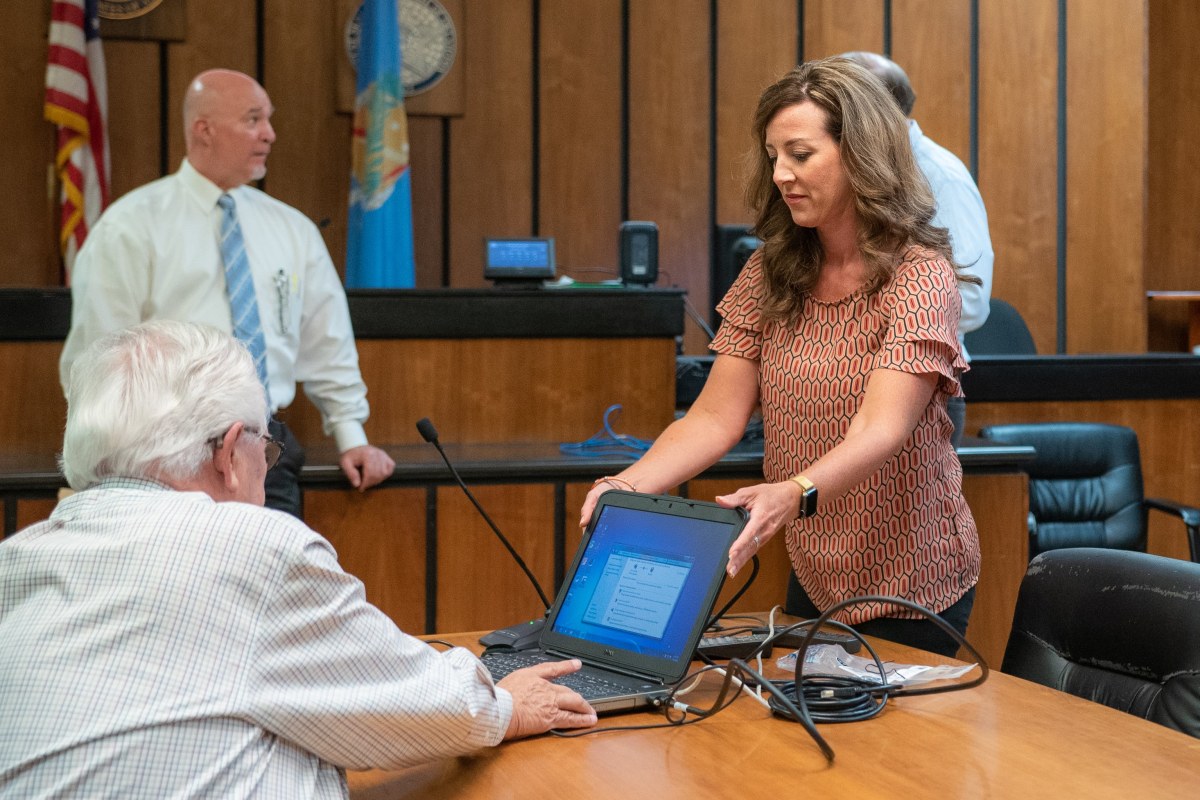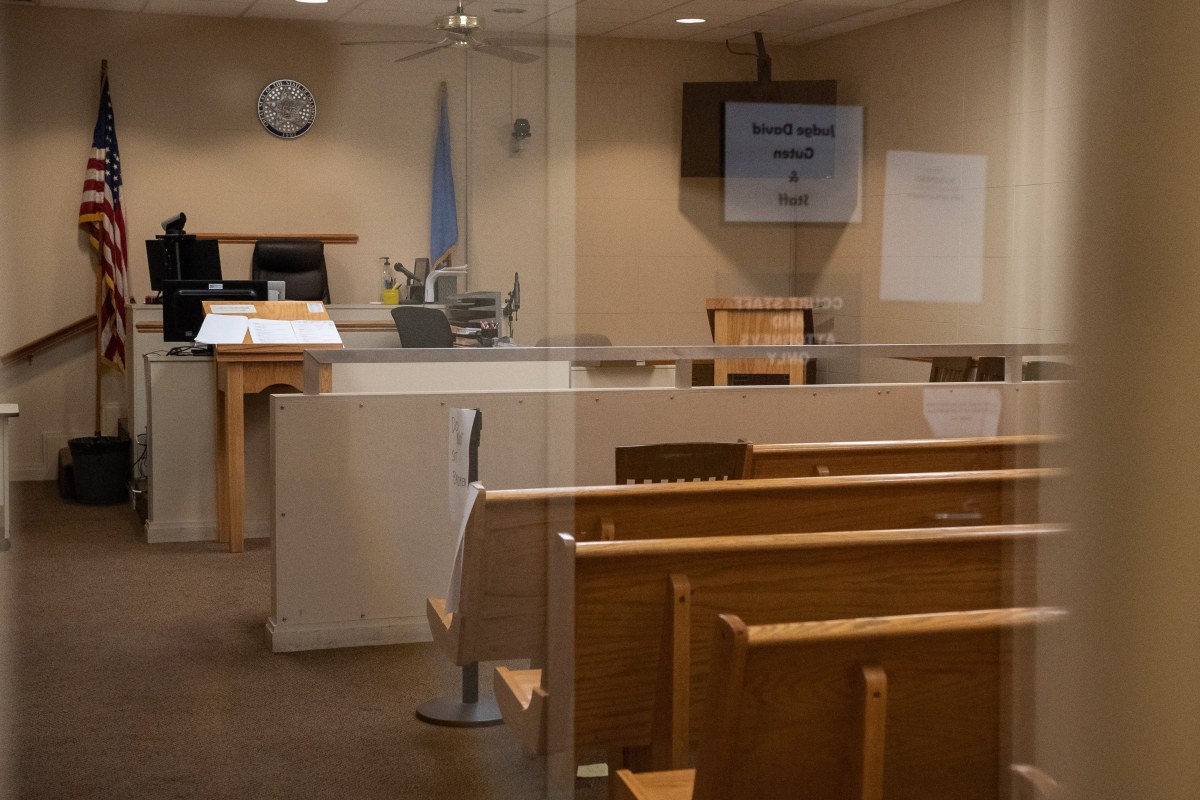Oklahoma Watch: Court Order Would Allow Abuse Victims to Testify by Video. Will Attorneys Object?
By Whitney Bryen
Published: November 8, 2019

Click here to read the story!
In the back of an Oklahoma County courtroom Tuesday, a woman was face to face with the man she says abused her.
Moments earlier, the judge had granted the woman’s request for a protective order against her boyfriend, who then began calling her names and threatening to hurt her, according to Oklahoma City victim advocate Laura McDonald, who was there.
The same day, after another woman was granted a protective order, the brother of her accused abuser followed her out of the courtroom and through the hallways, staring her down before she found a security guard, McDonald said.
Victims’ advocates say threats and intimidation frequently dissuade victims from showing up for court hearings, which often means protective order requests are dismissed.
Advocates and attorneys across the state say victims would be more willing to testify from a remote location where they don’t have to face their abuser. A little-known ruling by the Oklahoma Supreme Court in December gives district judges the power to make that call.
The decision expands opportunities for video conferencing in district courts to all civil or criminal proceedings at the discretion of individual judges. Because the opinion has not been officially published, it remains subject to change.
Some Oklahoma courts already use video conferencing for expert testimony, inmate arraignments and juvenile cases. So advocates ask, why not protective orders for victims?
McCurtain County District Judge Kenneth Farley said he has permitted remote testimony in a juvenile case, but never has been asked to do so for victim protective orders or domestic cases.
“I would have to have a request for it,” Farley said. “But I would certainly consider it if someone brought it up.”
Farley said he would expect objections from defense attorneys concerned about due process. The constitutional right to face an accuser could be an obstacle to allowing video testimony for domestic violence victims. Several victim advocates and attorneys said they don’t know if the argument has been made in an Oklahoma court, and victims who file for protective orders often cannot afford an attorney to make the case.
Assistant District Attorney Jacobi Whatley, who prosecutes Cleveland County’s felony domestic violence cases, said she never has asked for video testimony for an adult victim because she did not know the law allowed it.
“I think we’re not using it because no one knows about this,” Whatley said. After reading the Supreme Court opinion, Whatley said she plans to use the ruling to argue for video testimony sparingly in the future.
Even if a judge permitted video testimony, other complications could arise, such as the cost of technology for courts that are not equipped, providing a safe space for the victim to testify and unreliable internet service, especially in rural areas.
In Pierce County, Washington, courts offer remote appearances through Court Call, a California-based company that hosts and monitors video appearances for all types of cases nationwide. Jerry Wynne, protection order coordinator for the Pierce County clerk’s office, said remote appearances are used occasionally, being generally allowed if a victim feels it’s necessary.
Edie Liu, chief operating officer for Court Call, said courts receive the technology for free and the party appearing remotely needs access to a computer and reliable internet. There is a cost to the remote user, which Liu estimates would be about $75 for victim protective order hearings.
The company lists all judges and courts that use the technology on its website. No Oklahoma judges are listed. The only court listed for the state is Oklahoma’s Western District.
McDonald, who oversees protective orders at Oklahoma City’s Palomar, a family justice center, said about one-third are dismissed because victims do not show up to court. Suzann Stewart, executive director of Tulsa’s Family Safety Center, said about 25% of their protective orders were dismissed for failure to appear. The number is likely higher for victims who don’t have the support of an advocate, they said.

Advocates say protective orders offer increased safety and comfort to victims. Violating a protective order, which can include texting, calling or driving by the victim’s home, is a criminal offense. McDonald said this allows victims to set boundaries and control how much or how little interaction they have with the accused abuser. Police can arrest someone for violating a protective order, which is comforting for victims who fear for their lives, she said.
Fear and intimidation are not the only reasons victims don’t show up to protective order hearings. They may change their mind, lack transportation or childcare, or can’t afford to take time off from work. Advocates say they are working to address those issues, but there is little they can do to convince terrified victims to come to court.
Eileen Meadows, an advocate at Crisis Control Center in Durant, said it’s extremely intimidating for victims to recount their abuse in front of the abuser. Last week, one woman froze on the stand when asked to point to her abuser, Meadows said. The victim became overwhelmed and couldn’t testify after that, she said.
Kathy Manning, director of a family shelter in Ardmore, said having the option of remote testimony would be helpful to clients who are “revictimized over and over again every time they have to go to court.”

